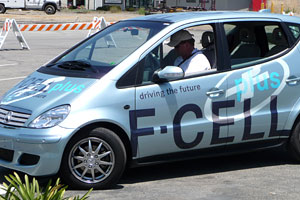Hydrogen is not exactly a fuel. That is, we don't burn it to make energy. It's used more as a medium for storing and transporting energy.
The science of hydrogen fuel cell systems is based on a simple concept. When you combine hydrogen with oxygen, energy is released. You get electricity. What makes it such a clean technology is that the byproducts of that chemical reaction are just heat and water. So when a fuel cell takes hydrogen from a fuel tank and combines it with oxygen in the air, it produces electricity and emits only a wisp of heated water vapor from the tailpipe.
Hydrogen is combustible (remember the Hindenburg?), and needs to be handled carefully. However, there are easy ways to demonstrate electrolysis, which breaks water apart into oxygen and hydrogen, and the opposite process of joining those chemicals. In fact, you could make a type of fuel cell in your kitchen, with a popsicle stick, battery clips, Scotch tape and a few other household products. You do need one item that can't be found in your kitchen: platinum wire or platinum-coated nickel wire.
Hydrogen is the most abundant element in the universe. And hydrogen fuel cell conversion is a squeaky clean technology. But the production of hydrogen for use in fuel cells -- that can produce a lot of carbon dioxide. In fact, most hydrogen is currently made by stripping, or re-forming, natural gas. That's one of the ongoing criticisms of fuel-cell technology, that it generates greenhouse gas emissions just to get the hydrogen in the first place.

